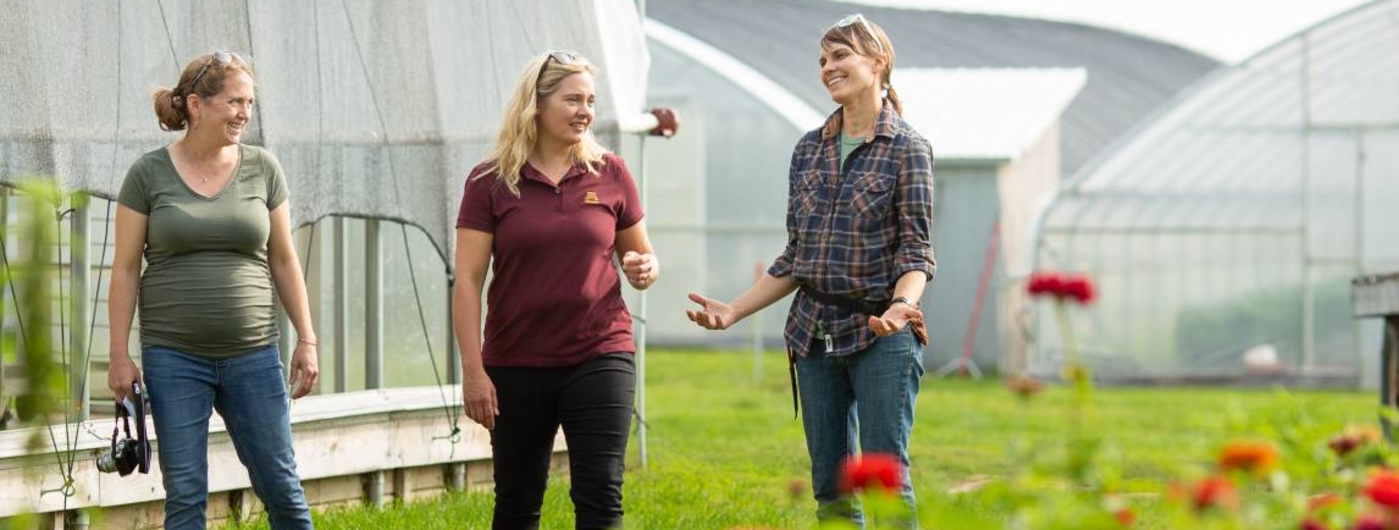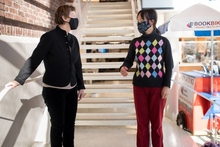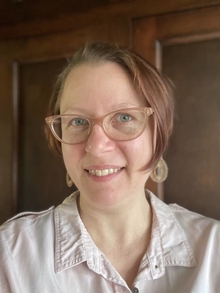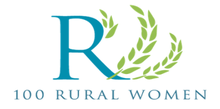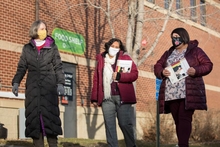The nonprofit, nonpartisan 100 Rural Women sees a future where more rural women lead positive change. Those interested in signing up for updates and joining the network to connect with other rural women and engage in mentorship, education and civic engagement opportunities can do so on 100 Rural Women’s website.
After the challenging year we’ve faced, the importance of connecting and empowering women leaders across Greater Minnesota has perhaps never been so evident as it is today.
“Women’s leadership is not just a ‘nice-to-have,’ we are finding it’s a matter of survival for our small towns,” said Kate Stower, graduate student at the Humphrey School of Public Affairs. Stower has been working to strengthen capacity among rural women leaders with the nonprofit 100 Rural Women, University of Minnesota Extension Northwest Regional Sustainable Development Partnership (Northwest RSDP) and Center for Urban and Regional Affairs (CURA), and with support from the Mary J. Page Community-University Partnerships Fund.
“The under-representation of women in rural leadership has always bothered me,” said Teresa Kittridge, founder and executive director of 100 Rural Women, who created the organization to support the unique challenges rural women face in pursuing leadership roles. “Women need to be represented and at the table making decisions.” Today, fewer than 18 percent of all city council, county board and mayoral positions are held by women in Minnesota.
“When we think of revitalizing small communities with dwindling and aging populations, it will rely on having more women in leadership … who can represent the changing needs of their communities,” Stower added.
We spoke with Stower to learn more about this community-engaged project and her experience as a student supporting its development, as she prepares to graduate this May.
Addressing barriers to rural women in leadership
For the past two semesters, Stower helped 100 Rural Women advance the organization’s mission to serve rural women by identifying, connecting and creating relationships, models of networking, leadership, mentorship and civic engagement.
During the course of the project, Stower worked closely with Kittridge and Linda Kingery, executive director of Northwest RSDP. Project activities included a review of existing literature on women’s leadership and networks, administering a survey of 180 women and organizing an initial series of four virtual workshops this spring to connect rural women across counties in Northwest Minnesota.
“In each of these activities, we were asking, ‘What are the barriers for rural women in leadership, and how do we overcome those?’” Stower explained.
Over 200 women across the region shared their experiences during the project. Participants cited barriers including a lack of resources, broadband access, education, self-confidence and social support and networks. Stower said many expressed frustration with competing demands of family care and inadequate child care options in rural areas.
For many, community expectations and norms also felt limiting. Stower explained that some pointed to harmful assumptions that family responsibilities prevent women from providing good leadership, or that women shouldn’t pursue careers in certain occupations. Some cited examples of being ignored, seen as too aggressive or criticized publicly, if they spoke up or pushed for change.
Despite these barriers, the project has found inclusivity and accessibility as important ways to advance leadership programming and support for women.
“While we expected a number of these limitations to be raised, especially given the COVID-19 pandemic, many of these women in rural areas actually talked about the opportunities,” Stower said. Opportunities to connect virtually have reduced some of the cited barriers such as transportation or finding childcare that may limit or prevent rural women’s engagement in leadership activities.
Drawing on lessons learned from the initial series of workshops this spring, 100 Rural Women will continue its efforts as it expands with a goal of hosting 100 meetings to connect rural women and develop their leadership capacity across the state.
“I’m excited to see how 100 Rural Women is able to scale up and grow this program in the future,” Stower said.
Carving out her own path to work with rural communities
Growing up in rural Wisconsin and working as a social studies educator in Greater Minnesota schools and in her work at the Minnesota Historical Society, Stower recognized that her heart is in rural America. She enrolled in the University of Minnesota Humphrey School of Public Affairs graduate program with the goal of supporting the vitality and resilience of small towns.
“After taking the only rural policy class currently available, I carved out my own path in my graduate program to get into rural communities. Internships allowed me to work alongside rural leaders. I learned so much about the challenges facing their communities and was able to bring my planning and policy research skills to support their work,” Stower said.
Her interests in civic engagement aligned well with the pilot project that 100 Rural Women, Northwest RSDP and CURA had proposed. She learned about the opportunity from two different professors, who saw this as a great fit for her interests and encouraged her to apply.
“This project has truly been such a gift,” Stower said. “There is something so magical working in community-university partnerships. I’ve learned so much from community leaders and their local expertise and wisdom.”
Navigating graduate coursework and a community-engaged research project while being fully remote during the COVID-19 pandemic came with its challenges.
“In a lot of ways, my life parallels that of the women we have been trying to reach this year,” Stower said, noting difficulties with juggling being a full-time student and mother of three young children without childcare during this time. “Like so many other women, we’re all trying to hold a lot together this year.”
Similar to the participants the project team has engaged in its virtual workshops, however, Stower didn’t dwell on the negative. She is optimistic about the power of women connecting with and learning from one another, the resilience and adaptability of small towns, and the ways community-university partnerships can support them.
“What we heard loud and clear from the survey and focus groups was that there is a great need to establish supportive networks like those 100 Rural Women is creating,” Stower said. “These networks can help foster community and cultural change to support women in taking on more leadership roles.”
Each year, the University of Minnesota Extension Regional Sustainable Development Partnerships (RSDP) connects dozens of University of Minnesota students like Kate Stower to community-university partnerships in Greater Minnesota. Students interested in learning about opportunities to engage in projects with RSDP can contact Student Engagement Director Mary Hannemann (oldha012@umn.edu) for more information.


